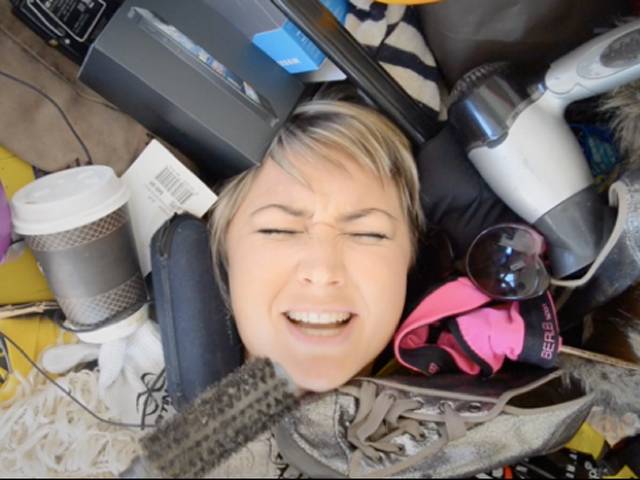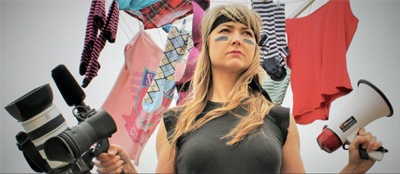Dr Holly Kaye-Smith Eco Warrior Interview

Fashion and Beauty Eco Warrior Helping Aussies Beat Climate Change
Dr Holly Kaye-Smith is a social change activist and academic at Western Sydney University who champions everyday-life activism to make our planet a better place to live, one small step at a time.
Question: When did you first begin to choose eco-friendly options?
Dr Holly Kaye-Smith: I used to make my own clothes, redesigning second hand clothes that had cool patterns and thought this could be a nice way to reduce fashion consumption and waste. During my PhD research at Western Sydney University I learned more about the devastating impact of fast-fashion. Our daily beauty regime has an ugly flipside. My research made me realise how impactful the way we consume, use and dispose of clothes really is for the environment, for people and animals.
Question: What is a human-centred solution and why is it important we chose these options?
Dr Holly Kaye-Smith: We hear a lot about 'consumer centred solutions' to the fast fashion problem. These are simply more eco-friendly versions of products, but they don't completely solve the problem. Human-centred solutions, on the other hand, lean more towards non-consumer orientated solutions. For example, we all know plastic bottles are bad for the environment. A consumer-centred solution to the issue would be to continue buying bottled water and recycle them. Recycling is VERY important and we DEFINITELY need to recycle whenever possible. But an even better solution would be to eliminate the plastic bottle all together, by using a reusable water bottle. This is human-centred solution because we tweak our behaviour to eliminate the problem all together.
Question: How can we become more eco-friendly, today?
Dr Holly Kaye-Smith: Think of yourself as an 'everyday-life activist', where situations in everyday life present opportunities to do things better – eco-warier moments. Collectively this has a MASSIVE impact. Simple things you can do include mending your clothes so that they last longer and washing them less. This reduces pollution and water wastage and they actually last longer – the wash cycle degrades the quality of the garment. Also avoiding single use plastic can have a big impact.
Question: How can we make small changes to our fashion purchases to combat climate change?
Dr Holly Kaye-Smith: To seriously address environmental degradation and climate change, we need to start buying and disposing of clothes less. People think they are doing the 'right thing' when they give their used clothes to charities. In reality, charities are so overwhelmed with donations that they can go bust for sending clothes to landfill and spend more time sifting through and disposing of low quality garments than passing on suitable clothes to the needy. We need to change our mentality in thinking that we can palm off our old clothes that we don't want to charity so we can buy more stuff!
Instead, aim to reduce the size of your wardrobe, buy ethically produced or recycled clothing, share and borrow clothes rather than buying new ones, look after your clothes so they last longer. Consider the fabric and use-ability of clothes. Some synthetic fabrics smell more when in contact with daily life so they require more washing and get thrown out faster.
I personally love Gok Wan's concept of the 24 capsule wardrobe where every item goes with at least 3 other items in your wardrobe. This mentality reduces excessive consumption and buying one-off items that get discarded faster.
 Question: How can we change our beauty habits to combat climate change?
Question: How can we change our beauty habits to combat climate change? Dr Holly Kaye-Smith: There are simple things we can do to reduce the environmental impact of our daily beauty regime. Try to avoid plastics (eg. Replace disposable razors with stainless steel razors), and use reusable rather than disposable stuff (like reusable cosmetic wipes or a washcloth instead of cotton buds or disposable wipes). You can also make your own face lotions to reduce package waste, mileage emission, and choose soap and shampoo bars over liquid versions for the same reason.
Question: What small changes can we make, to our everyday routines, to have a big impact on the environment?
Dr Holly Kaye-Smith: Be thrifty and reduce your consumption of finite resources. Our throw-away lifestyle has only been made possible in recent decades by cheap plastics and globalisation. Our everyday actions may seem to be small and insignificant but they all add up. So as you get ready in the morning, go to work, hit the shops, remember your everyday choices matter. You can be an everyday-life activist too by being thrifty with your activities, buying less and choosing eco-friendlier options.
Question: How can we update our laundry habits to help the environment?
Dr Holly Kaye-Smith: Only wash clothes that are actually dirty; 93% of the clothes we wash aren't dirty! All too often we instinctively chuck everything into the laundry bin, when our clothes are neither smelly nor stained. If you have worn something only for a short time, try airing a garment, spraying on diluted lemon juice or chucking it into the sun to freshen it up. Use a mild laundry detergent that's grey water safe and avoid fabric softeners as they contain chemicals that are harmful to humans and animals. Line dry your clothes outside as the sun's UV rays are a natural whitener and kill germs, and avoid using a clothes dryer. If you have to use a dryer, add an old tennis ball to the load so it dries faster and the laundry (especially towels) will feel softer.
Question: What is 'Sniffing armpits for the planet'?
Dr Holly Kaye-Smith: 'Sniffing armpits for the planet' was a playful way to get people interested in the environmental impacts of laundering. I asked people on the street to sniff the armpits of my eco-refreshed clothes (using sun and air, diluted lemon juice sprayed onto the armpits, and shower steam) to get people talking about washing less and share clever ideas about how to cheat a wash. It's the power of humour that allows people to overcome social anxieties, connected with personal hygiene to learn about new ways of doing things. Watch here.
Question: What do you hope to achieve from 'Sniffing armpits for the planet'?
Dr Holly Kaye-Smith: I really wanted people to reflect on their everyday actions and how they contribute to bigger problems such as pollution and climate change without thinking much about it. Laundry is a topic that everyone can relate to, and where small changes make a big impact if just enough people choose doing things a bit differently. My mission is to get people thinking critically about their daily activities to see the opportunities for everyday-life activism, and make our planet a better place to live, one small change at a time!
For more information please see: https://www.westernsydney.edu.au/hie/earthiq
Interview by Brooke Hunter
MORE





